Waterstones
Waterstones, formerly Waterstone's, is a British book retailer that operates 283 shops, mainly in the UK and also other nearby countries.[4] As of February 2014, it employs around 3,500 staff in the UK and Europe.[5] An average-sized Waterstones shop sells a range of approximately 30,000 individual books,[3] as well as stationery and other related products.
| Private | |
| Industry | Retail Bookshop |
| Founded | Old Brompton Road, London, 1982 |
| Founder | Tim Waterstone |
| Headquarters | , United Kingdom |
Number of locations | 283 shops (Sept 2018)[1] |
Area served | UK, Ireland, Belgium, Netherlands |
Key people | James Daunt (MD) |
| Products | Books |
| Revenue | £392 million(2019) [2] |
Number of employees | 3,500[3] |
| Parent | Elliott Management Corporation |
| Website | www.waterstones.com |
Established in 1982 by Tim Waterstone, after whom the company was named, the bookseller expanded rapidly until being sold in 1993 to WHSmith.[6] In 1998, Waterstones was bought by a consortium of Waterstone, EMI & Advent International.[7] The company was taken under the umbrella of HMV Group, which later merged the Dillons and Ottakar's brands into the company.[6] Following several poor sets of results for the group, HMV put the chain up for sale. In May 2011, it was announced that A&NN Capital Fund Management, owned by Russian billionaire Alexander Mamut, had bought the chain for £53.5m[8] and appointed James Daunt as managing director.[9] The company is incorporated in England & Wales as Waterstones Booksellers Ltd, with its registered office at 203–206 Piccadilly, London (which is also the location of its flagship shop). As well as the Waterstones brand, the company owns the London bookseller Hatchards,[10] Irish shop Hodges Figgis,[10] and reached an agreement to purchase Foyles in 2018.[1] In April 2018, hedge fund Elliott Management Corporation bought a majority stake in the company.
The bookseller has concession agreements with Paperchase and previously with coffee chains Costa Coffee and Starbucks in some shops, but since 2012 has introduced its own Café W brand.[11] For a time, Waterstones sold eReaders, including in 2012 partnering with Amazon to sell the Amazon Kindle,[12] but has since pulled out of this market for commercial reasons.[13]
Waterstones administers and supports various literary awards, including the Children's Laureate award[14] and the Waterstones Children's Book Prize.[15]
History and developments
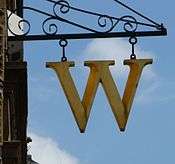
Formation & WHSmith: 1982–1998
The chain was founded by Tim Waterstone after he took a[16][17] £6,000 redundancy payout from WHSmith. He set up his first shop in Old Brompton Road, Kensington with the ambition of creating a 'different breed of bookshop', using techniques he had seen in the United States.[16] He used literary authors in front of shop displays and employed highly literate staff.[18]
The model proved successful and the chain set about expanding its shop portfolio. In 1990 WHSmith took a strong minority stake in the chain, and ten years after its birth, by 1992, Waterstone's had grown to be the largest bookseller group in Europe. WHSmith [18] then acquired the company in 1993 at an enterprise value of £47m, paying £5.27 a share on 8.1m 10p shares, a 53x multiple for the early stage investors.[19] Under WHSmith, Waterstones pursued international expansion, opening its first US shop in Boston in 1991,[7] as well as further domestic expansion – opening its 100th UK shop in a former chapel in Reading.[7]
The chain was part of the eventual dismantling of the Net Book Agreement, when in 1991, following a promotion by then rivals Dillons, the company decided to pursue its own discounting promotion on selected titles.[20] By 1997, the agreement had collapsed and been declared illegal.[21]
HMV Group: 1998–2011
Following an attempt by Tim Waterstone in 1997 to buy the entire WHSmith group, WHSmith sold the Waterstones chain for £300 million to HMV Media plc (now HMV Group) – a joint venture between EMI, Advent International and Tim Waterstone.[7] This included high street brands HMV and rival Dillons, creating an international entertainment retailer. Waterstone was appointed chairman of the group but stood down in 2001, citing "concerns for the way the company was being run" [19] and was replaced by Alan Giles.[22] A year later, all Dillons shops were rebranded as Waterstones, with some sold to rival Ottakar's making the brand defunct. The chain had also begun pulling out of its US overseas venture.[23]
Waterstones launched the Waterstones Books Quarterly magazine in 2001, containing book reviews and author interviews. In the same year the booksellers' online operation, Waterstones.co.uk, was franchised to Amazon.com, with the company expressing a desire "to concentrate on its high street and campus shops". The move resulted in the loss of 50 jobs.[24] In 2003, Waterstones announced it was supporting Dyslexia Action as its chosen charity, helping to raise awareness and understanding for dyslexia.[25]

In 2006 Giles stepped down from his position and was replaced by Gerry Johnson as managing director of Waterstones[26] and Simon Fox as group CEO.[27] In April 2006 following two bids by Permira for the group, Tim Waterstone attempted to buy back the company from HMV for £256 million,[28] but later withdrew his offer specifying the conditions set by HMV were "too punitive" to accept.[29] A strategic review in September saw Waterstones pull out of its franchise agreement with Amazon to re-launch its online business, Waterstones.com, independently.[30] The chain also began to pilot a loyalty programme in South West England and Wales. The scheme was successful, launching nationally as The Waterstones Card across its entire shop portfolio.[31]
Waterstones piloted a brand refresh exercise in selected shops, beginning with Manchester's Arndale Centre in 2007.[32] On 19 November 2007, the chain closed its first branch on Old Brompton Road.[33] Following a consultation, the company's supply chain was overhauled in 2008 with the implementation of a 150,000 sq ft (14,000 m2) warehouse and distribution centre in Burton-upon-Trent. Existing direct-to-store deliveries from suppliers were replaced by a centralised warehouse capable of receiving merchandise and sorting an estimated 70 million books per year and 200 staff were made redundant by the process.[34][35] In September 2008, Waterstones began selling the Sony Reader in an agreement which saw the booksellers' branches and Sony Centre shops stock the reader exclusively for two weeks after its release. Waterstones.com began to supply eBooks in the .epub format.[36] In November 2009, Waterstones moved into second-hand bookselling in a partnership with Alibris setting up an online reselling tool called Waterstones Marketplace, part of Waterstones.com.[37]
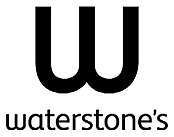
In January 2010, HMV Group announced that Waterstones like-for-like sales over the Christmas period were down 8.5 per cent on the previous year. This culminated in the resignation of managing director Gerry Johnson with immediate effect.[38] He was replaced by development director Dominic Myers, who was managing director of the British academic bookselling chain Blackwells until 2005.[39] Myers joined HMV in 2006 to oversee the integration of Ottakar's into the chain. In response to the decline in sales, he implemented a three-year plan in which branches were tailored to their local market alongside a 'rejuvenation'[40] of the company brand and an increase in range. As part of these changes, Waterstones implemented new branding in May 2010, developed by agency VentureThree.[41] The company also moved to support the Rainbow Trust, which provides support to children with life-threatening and terminal illnesses and their families, in the same year.[42]
After an announcement that profits would be at the lower end of analysts' forecasts due to falling sales and a share price fall of 20%, HMV Group indicated its intention to close a number of Waterstones branches in January 2011.[43][44] These shop closures, including two in Dublin, Republic of Ireland[45] and nine others across the United Kingdom occurred in February 2011.[46] Further branch closures in Luton, Dorking, Lancaster University, Harrods, Gateshead and Norwich Arcade were completed by the end of 2011.[47]
Alexander Mamut & James Daunt: 2011–present
In May 2011 HMV Group announced the sale of Waterstones to A&NN Capital Fund Management, a fund controlled by Russian businessman Alexander Mamut for £53 million.[48] The takeover was welcomed by publishers as "a step forward to re-establishing a proper physical presence".[49] On 29 June 2011, the sale of Waterstones was completed and approved by the vast majority of shareholders at an emergency general meeting.[9] Mamut appointed James Daunt, founder of Daunt Books, as managing director[50] and a board of directors was announced in October 2011 including Miranda Curtis as chairman.[51] In September 2011, the bookseller announced that it intended to drop its 3-for-2 deal on books after a decade.[52] The offer was replaced with a 'bespoke offer', based on branches choosing their own pricing structures from available discounts.[53]
In January 2012, the company announced that it would be moving away from the branding developed in 2010 by agency VentureThree,[41] and reverting to its original logo.[54] This involved the removal of the apostrophe from its name, saying it would be "a more versatile and practical spelling". This decision received media coverage, in which the company was subject to criticism. John Richards, of the Apostrophe Protection Society, said that the change was "just plain wrong" and "grammatically incorrect"[55] while the move sparked outrage on Twitter, involving debate on whether the move was grammatically incorrect or not.[55] James Daunt expressed that "Waterstones without an apostrophe is, in a digital world of URLs and email addresses, a more versatile and practical spelling".[56] Linguist David Crystal on his blog added: " ... if Waterstone's wants to become Waterstones, that's up to the firm. It's nothing to do with expressing possession or plurality or anything to do with meaning."[57]
In the same month, Waterstones confirmed plans to open a Russian language bookshop in its Piccadilly branch, intending to stock 5000 titles with the shop being entirely staffed of Russian-speaking booksellers.[58] The concession, named The Russian Bookshop, opened in March 2012.[59]
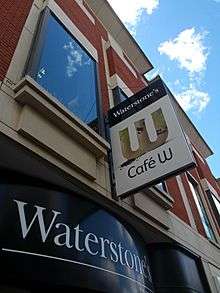
Following a decision in late-2011 to scrap an e-reading offer in-branch,[60] it was announced in May 2012 that Waterstones would be selling the Amazon Kindle across its estate. James Daunt launched the new agreement with Amazon stating that Waterstones would be offering "e-reading services and offer Kindle digital devices" throughout the company's branches and on its website, with an intention to "make the Kindle experience better".[12] This announcement was received with surprise across the book industry as it had been suggested that Waterstones was developing a partnership with Barnes & Noble to launch the Nook in the UK, or that the company was developing its own device, but Daunt "ultimately rejected" other avenues as Waterstones "would have been out of the market" before their implementation.[61]
It was also announced in May 2012 that the company would begin a refurbishment plan, with Mamut "investing tens of millions of pounds" to fund the refit of a planned 100 shops before the end of the year. The plan saw the introduction of wi-fi into shops,[62] reorganisation of shop sections and space[63] dedicated areas for Kindle devices, and a number of own-brand coffee shops called Café W.[64] The Café W brand was trialled in the Sutton branch, with an expressed aim for around 130 shops over a 3-year period to be fitted with a café.[65] The announcement also noted the introduction of a 'click-and-collect' service.[63]
The Amazon Kindle officially launched in-branch in October 2012 with an "outdoor and press advertising campaign" promoting the launch, with the Kindle Fire and Kindle Paperwhite model going on sale for the first time in the UK along with older models.[66] The Kindles were tailored with Waterstones screensavers, which led to some complaints and customers attempting to return their devices.[67] The release of the Kindle coincided with a relaunch of the company's brand in the same month, pushing the message that the chain was the 'nation's leading bookshop' and producing an exclusive anthology, the Waterstones Red Anthology, to help promote the shops.[68]
By the end of 2012, the Waterstones estate had shrunk to 288 shops,[69] with "commercial reasons" given for the closure of branches in Bromsgrove,[70] Stevenage,[70] Watford,[69] Fleet Street,[69] High Holborn[69] and Epsom[71] among others, with staff being redeployed where possible. In 2012, Daunt stated that future expansion was being considered, based on the performance of the company.[64] The accounts for the year to 2012 showed Waterstones, prior- and post-acquisition had made losses of £37.3 million[72]
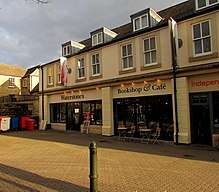
Started in 2012 was an overhaul of the company's business strategy, with centralised decision making giving way to shop-based decisions and a renewed emphasis on traditional bookselling techniques.[73] Waterstones embarked on a major restructuring of staffing levels, with a company-wide consultation with 560 managerial staff to subsequently reduce roles within the company.[74] This consultation led to Head Office staff departures[75] and around 200 branch and regional managers leaving their posts.[76] Waterstones launched a number of new partnerships through the year, including with the University of Derby to launch a professional qualification programme for its staff,[77] with the Folio Society to extend customer reach and stock selection in London-based bookshops,[78] and partnering with a new charity, BookTrust.[79] By the end of 2013, Waterstones had cut its losses to £12.2 million, opened 12 further Café W outlets, and embarked on a capital investment in its shop portfolio of £29.5 million.[80]
In 2014, the opened new shops in Ringwood, Blackburn[5] and Southwold, its first branch to be without Waterstones branding,[81] as well as closing shops in Eastleigh and St Neots.[82] Continued business strategy change saw further departures from head office in brand communication and PR[83] and a renewed agency contract for Waterstones' digital marketing with Epiphany.[84] The retailer overhauled its business technology with new algorithms on its website to help personalise the online shopping experience,[85] updated point-of-sale IT[86] and by introducing contactless payment in its shops.[87] The retailer partnered with Airbnb to hold a one-off ‘sleepover’ for customers in its Piccadilly branch in October 2014 after a customer was accidentally trapped in the Trafalgar Square branch after closing.[88] Accounts for 2014 saw operating income losses narrow to £3.8 million, but sales slip by 5.9%.[89]
The ongoing strategic changes made to the way the business operates[90] included the decision in October 2015, after 3 years on sale in shops, to remove the Kindle from its offer following "pitiful" sales and handing the retail space over to books.[13] This was followed, after a failed attempt to buy BlinkBox books from Tesco in January 2015,[91] with Waterstones announcing it had sold its ebook business to Rakuten Kobo Inc in May 2016,[92] subsequently directing customers who had purchased eBooks through the retailer to access their ebooks via Kobo's eBook site.[93] This sale represented an exit from the eBook and eReader market for Waterstones after 8 years and multiple platforms.[94]
The company partnered with Oxfam in 2015 to raise £1 million for those impacted by the Syrian civil war crisis through a nationwide campaign called ‘Buy Books for Syria’.[95] Further changes to shops were made in 2015, with the closure of Wimbledon[96] and Birmingham New Street,[97] the opening of The Rye Bookshop[98] and a return to Welwyn Garden City.[99] The company reported an operating income of £5.4 million and a further narrowing of losses to £4.5 million from £18.8 million the previous year.[100]
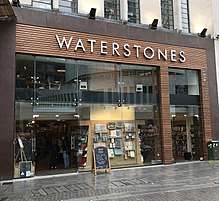
In a 2016 interview with Daunt, he stated that Amazon "defines how Waterstones acts" and while Waterstones could not compete with the internet retailer digitally, it could offer a credible alternative, believing there was "a future in physical bookselling." [101] Waterstones continued to look at "fixing the basics" during 2016, such as adjusting shop opening hours and harnessing data from the loyalty card[102] as well as refurbishment of physical shops, including the Canterbury branch,[103] and work on its e-commerce routes through improvements to product ranking.[104] Shops in Oxford Street Plaza, Edinburgh George Street,[105] and Reading Oracle[106] were closed, Harpenden Books,[107] Glasgow Fort,[108] Tottenham Court Road[109] were opened and Wimbledon[105] and Watford[110] were reopened in new sites. The newly opened shops benefitted from a refreshed brand look, widely welcomed by the book trade.[111] The retailer renewed its partnership with Oxfam to continue to raise money for the Syrian crisis, donating £5 for each ‘Book of the Month’ sold in-shop during November 2016.[112] Daunt made public his concern that the UK EU referendum was likely to impact on company sales due to an expected retail downturn following a ‘no’ vote.[113] He later noted that sales had remained ‘buoyant’ following the decision to leave the EU, but remained pessimistic for the future.[114]
Accounts show that Waterstones made its first profit in 7 years of £11.7 million in the year ending April 2016.[115] This included increased profits in Ireland, with sales rising 7% over the year,[116] with the company expressing a desire to open more shops in Ireland.[117] The management board was reduced from 7 members to 3 in August 2016, with the departure of Miranda Curtis and a statement that the future composition was under review.[118] Waterstones announced it had raised £300,000 for BookTrust in 3 years since partnering, and would continue the partnership for a fourth year.[119]
In April 2018, hedge fund Elliott Management Corporation bought a majority stake in the company, leaving Alexander Mamut's Lynwood Investments with a minority holding.[120] The sale completed in early June 2018.[121] Daunt remained as chief executive.[122]
Takeovers
Dillons
Acquired in 1995 by the Thorn EMI group, Dillons was the UK's second largest bookseller behind Waterstones and was the bookselling arm of EMI's retail division, which included HMV.[123] Following the demerger of Thorn and EMI in 1996, the retail arm was divested from the EMI portfolio within a year and spun off into the HMV Media Group, an investment venture between EMI Group and Advent International private equity group.[7] This venture included HMV, Dillons and Waterstones (the latter bought from WHSmith for £300 million), combining to make an international entertainment retailer of over 500 shops.[123] Following a rebuffed takeover attempt in 1997 of WHSmith, Tim Waterstone became part of the deal and by May 1998, following the £801 million deal completion became chairman of the group.[123] All Dillons shops were incorporated within the Waterstones brand by 1998.[124]
Ottakar's
In September 2005 HMV Group began attempts to buy rival book chain Ottakar's. This alarmed publishers and authors[125] who hoped the Office of Fair Trading would refer the takeover bid to the Competition Commission. In March 2006, the Competition Commission cleared Waterstones for takeover of the Ottakar's, stating the takeover would "not result in a substantial lessening of competition", and is "not likely to affect book prices, range of titles offered or quality of service." Through extensive research they also found that "contrary to widespread perception, Waterstones, like Ottakar's, operates a book-buying system which mixes central and local input on stock selection."[126]
On 31 May 2006, Waterstones announced that it had successfully negotiated the takeover of Ottakar's. HMV chief executive Alan Giles said: "A combined Waterstones and Ottakar's business will create an exciting, quality bookseller, able to respond better to the increasingly competitive pressures of the retail market." Ottakar's chairman Philip Dunne said: "Over the last year the book market has undergone a significant change with new levels of competition from the supermarkets and online retailers impacting all specialist booksellers and in particular those with insufficient scale to compete on equal terms."[127]
Following the takeover, HMV announced that they would be rebranding every branch of Ottakar's as a Waterstones. In July 2006, a conversion programme was initiated and within four months, every Ottakar's shop had been relaunched as a Waterstones and had seen the loss of 100 jobs.[128]
Books Etc
In August 2008, the now defunct Borders chain agreed to sell eight Books Etc. shops to Waterstones for an undisclosed sum. The takeover, which represented 34,000 sq ft of retail space and incurred no staff losses, increased Waterstones' presence within London to almost 50 shops, "crucially [in] areas that are not represented by Waterstones bookshops". The shops, in Fleet Street, London Wall, Holborn, Wandsworth, Uxbridge, Finchley Road, and Canary Wharf, were rebranded and merged into the Waterstones chain by September 2008.[129]
Ethical standards
Tax
Tim Waterstone and James Daunt have been critical of tax avoidance by Amazon.com in the British press.[130][131] Amazon has received sustained scrutiny for the amount of its overall sales that are reported by its UK subsidiary, in comparison to those 'processed offshore in Luxembourg to avoid UK tax'.[132] In the 2012–13 financial year, Amazon paid £3.2 million in tax on sales of £4.2 billion and received £2.5 million in grants from the government.[133] In the same period, it was revealed that Waterstones paid £11.9 million in tax, despite an operating loss of £25.4 million and sales of £410.4 million.[134][135]
In a report on tax avoidance in the book industry, the magazine Ethical Consumer argued that A&NN Capital Fund Management, Waterstones' parent company in Bermuda, "likely to be for tax avoidance purposes".[136] In response to this, Waterstones issued a clarification on their website reading "As a UK registered and domiciled business, Waterstones fulfils all its tax obligations. This will include both the payment and reporting of all necessary UK taxes, as set out under UK tax legislation." [137] In the 2013–14 financial period, the first full year under A&NN, Waterstones reported sales to Companies House of £398.5 million and an operating loss of £12.2 million.[138]
Non-branded shops
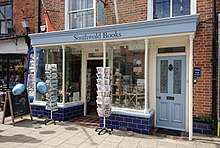
Waterstones opened its first non-branded shop in Southwold, Suffolk in July 2014 called Southwold Books.[139] The company decided not to use its branding as it wished to ‘fit in’ with the town’s high proportion of independent retailers, but this move drew anger from local residents at the time as they viewed the move as "dishonest" and said that local shop rents were being increased because of retail chains moving in and this subsequently was "changing the character of the high street".[139]
Non-branded Waterstones became an issue again in 2016 at a national level, following newspaper reports about not only Southwold Books but two further shops, The Rye Bookshop in Sussex and Harpenden Books in Hertfordshire, being opened and local residents not realising the connection with the retailer.[140][141] Commentators were split on the ethics of the decision to open unbranded shops,[142][143] but it was noted that at no point had attempts been made to hide the connection to the retailer.[144] In interviews, James Daunt denied any "subterfuge" and said he wanted for the shops to behave as independent retailers do and have their own identity. He further stated that more unbranded shops were likely to open in the future.[145]
Environmental impact
Waterstones has worked with the British Safety Council to consider its environmental impact, including factors beyond its carbon footprint. After a 2008 audit, the Council awarded Waterstones three out of a possible five stars for environmental impact.[146]
Real living wage
As of March 2019, Waterstones does not pay the "real living wage", as recommended by the Living Wage Foundation, and a rate significantly higher than the official National Living Wage. More than 1,300 writers backed a campaign to ask Waterstones to pay the "real living wage". In response Waterstone managing director James Daunt said the company was "simply not profitable enough" and that "there's a long gap between wanting to do something and it being remotely sensible". Waterstones said that only Ikea, Majestic and Lush of other similar large retailers pay the "real living wage".[147]
Awards
Waterstones maintains and supports various literary awards, including the Waterstones Children's Laureate,[14] the Waterstones Children's Book Prize,[15] The Waterstones Book of the Year, and the Pushkin House Russian Book Prize[148] as well as now defunct awards including the Waterstones 11[149] and The Guardian First Book Award.[150] The company has also received various industry and consumer awards.
Waterstones prizes
Children's Book Prize
Waterstones continued the Ottakar's Children's Book Prize under its own brand and since 2005, the Waterstones Children's Book Prize has attempted "to uncover hidden talent in children's writing" by awarding authors with no more than two previously published books (adult or children's fiction).
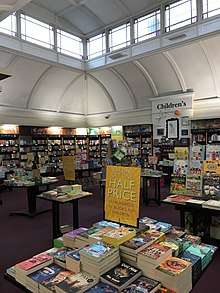
- 2017 The Girl of Ink and Stars by Kiran Milwood[151]
- 2016 My Brother is a Superhero by David Solomons[152]
- 2015 Blown Away by Rob Biddulph[153]
- 2014 Rooftoppers by Katherine Rundell[154]
- 2013 Ketchup Clouds by Annabel Pitcher[155]
- 2012 The Pirates Next Door by Jonny Duddle[156]
- 2011 Artichoke Hearts by Sita Brahmachari[157]
- 2010 The Great Hamster Massacre by Katie Davies[158]
- 2009 The Thirteen Treasures by Michelle Harrison[159]
- 2008 Ways to Live Forever by Sally Nicholls[160]
- 2007 Darkside by Tom Becker[161]
- 2006 The Diamond of Drury Lane by Julia Golding[162]
- 2005 The Cry of the Icemark by Stuart Hill[163]
Waterstones is also the main sponsor of The Waterstones Children's Laureate, previously sponsored by Ottakar's. The 2011–2013 role saw the position carry the Waterstones branding for the first time, with the company stating it was 'up weighting [its] activity' and 'supporting the role in shops and online in different ways throughout the year and beyond.'[164] Holders of the role during sponsorship include Julia Donaldson, Malorie Blackman and the current holder, Chris Riddle.[165][166]
Waterstones Book of the Year
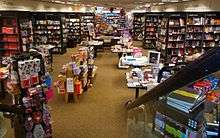
The prize, which has been running since 2012, sees booksellers from across the company select a shortlist of books from any category, published at any time, before the winner is chosen by panel.[167]
- 2018 Normal People by Sally Rooney
- 2017 La Belle Sauvage: Book of Dust Volume One by Philip Pullman[168]
- 2016 The Essex Serpent by Sarah Perry[169]
- 2015 The Fox and the Star by Coralie Bickford-Smith[170]
- 2014 The Miniaturist by Jessie Burton[171]
- 2013 Stoner by John Williams[172]
- 2012 Polpo by Russell Norman[167]
The Waterstones 11
Set up in 2011, the Waterstones 11 was created to promote debut literary fiction from new authors being published in the year ahead.[173] Books were chosen from a list of 100 submitted by publishers, and were announced in January 2011 with in-shop and online support, as well as a media campaign for the final 11.[174] The inaugural 11 included the Orange Prize Winner The Tiger's Wife by Téa Obreht, Man Booker Prize nominee Pigeon English, by Stephen Kelman and the Edinburgh International Book Festival First Book Award winner When God Was a Rabbit, by Sarah Winman.[173] The last list was announced in January 2013,[175] following the discontinuation of the prize in January 2014.
Locations
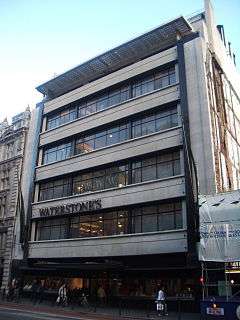
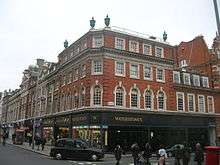
Waterstones has academic and high street shops in Europe including the United Kingdom, Republic of Ireland (with shops in Cork, Drogheda, and in Dublin under the name Hodges Figgis) and in the Netherlands and Belgium. Some branches in the company occupy buildings of architectural and historical interest.
Flagship superstores
Its flagship shop on Piccadilly, formerly the Simpsons of Piccadilly department store and notable for its 1930s-Modernist architecture, is the largest shop in the Waterstones estate and claimed to be the largest bookshop in Europe.[176] The main academic branch, formerly the flagship shop of Dillons, is located on Gower Street, between University College London and the Student Central, and promoted as Europe's largest academic bookshop.[177] Aside from these branches, Waterstones operates a number of large shops which are set over multiple floors. Waterstones refers to these shops as 'superstores':[3]
- Piccadilly, London (formerly Simpsons of Piccadilly) – flagship branch with six floors and an estimated 8 1/2 miles of shelving.[178] In 2012, the head office of the company was moved to the shop.[179]
- Gower Street, London – academic branch with five floors and 5 miles of shelving[180]
- College Lane, Liverpool – two floors, including the largest open-plan floor of books in Europe.[181]
- Deansgate, Manchester – three floors, with over 100,000 books in stock.[182]
- Milsom Street, Bath – three floors, with over 55,000 books in stock.[183]
- La Scala Cinema,[184] Sauchiehall Street, Glasgow – five floors, set in a former cinema[185]
- Bridlesmith Gate, Nottingham – four floors, with concessions[186]
Shops of architectural and historical interest
- Kalverstraat, Amsterdam, designed by Dutch architect Hendrick Petrus Berlage
- Wool Exchange, Bradford
- High Street, Birmingham, formerly Times Furniture Company
- Dolphin & Anchor, West Street, Chichester,
- West End Princes Street, Edinburgh
- Corn Exchange, Lincoln,
- Emerson Chambers, Newcastle upon Tyne
- William Baker House, Cornmarket St, Oxford
- Fishergate, Preston, formerly Booths grocery and head office
- Broad Street, Reading, formerly Broad Street Independent Chapel
- The Tontines Building, Parliament Row, Stoke-on-Trent
- The Carlton Cinema, Swansea
See also
- Books in the United Kingdom
- Hatchards
- HMV Group
References
- "Waterstones buys Foyles to defend bookshops against Amazon". BBC News. 7 September 2018. Retrieved 8 September 2018.
- Szajna-Hopgood, Ava. "Waterstones full year profits rise 39% - Retail Gazette".
- "About Us | Waterstones.com Help | Waterstones". www.waterstones.com.
- "Bookshops in the UK and Europe – Waterstones". Retrieved 24 September 2016.
- Flood, Alison (28 February 2014). "Waterstones boss James Daunt: 'We can sell enough books to stay alive'". Retrieved 24 September 2016 – via The Guardian.
- "Waterstone's: a history". The Telegraph. London. 20 May 2011. Retrieved 17 January 2012.
- WH Smith PLC. "History of WH Smith: 1990-Today". WH Smith Company Information. Retrieved 17 January 2012.
- "James Daunt: the man who saved Waterstones". Evening Standard. 10 December 2014. Retrieved 4 September 2019.
- Sillitoe, Ben (29 June 2011). "HMV Group completes sale of Waterstone's". Retail Gazette. Archived from the original on 25 September 2011. Retrieved 29 June 2011.
- "Find your local Waterstone's". Waterstones. Retrieved 28 January 2012.
- "Café W to be rolled out at Waterstones". Retrieved 24 September 2016.
- Jones, Philip (21 May 2012). "Waterstones signs Kindle deal with Amazon". The Bookseller. Retrieved 21 May 2012.
- Shepherd, Jack (8 October 2015). "Waterstones to remove Amazon's Kindle from shops". The Independent. Retrieved 1 May 2017.
- "The Children's Laureate". The Children's Laureate. Retrieved 19 January 2012.
- "Waterstones Children's Bookprize". Waterstones. Retrieved 19 January 2012.
- John L. Thompson; Frank Martin (2010). Strategic Management: Awareness & Change. Cengage Learning. p. 401. ISBN 978-1-4080-1807-1.
- Blackhurst, Chris (5 October 1997). "Profile: Tim Waterstone - A battle of heart and head". The Independent. London. Retrieved 3 October 2013.
- Walker, Tim (14 March 2011). "Do bookshops have a future?". The Independent. London. Retrieved 17 January 2012.
- "Waterstone 'coy' on bid for book chain". The Bookseller. 7 February 2011. Retrieved 17 January 2012.
- Cassidy, Suzanne (7 October 1991). "THE MEDIA BUSINESS; British Book Shops in Price Skirmishes". The New York Times. Retrieved 17 January 2012.
- Jordison, Sam (17 June 2010). "Time to bring back the net book agreement?". The Guardian. London. Retrieved 6 February 2012.
- Dermarzio, Paula (12 June 2006). "HMV's CEO Alan Giles set to quit". ABC Money News. Retrieved 19 January 2012.
- Rosen, Judith (17 May 1999). "Waterstone's Looking to Sell Boston Stores". Publisher' Weekly. Retrieved 17 January 2012.
- "Amazon in Waterstones Deal". BBC News. BBC. 26 July 2001. Retrieved 19 January 2012.
- "Waterstones and Dyslexia Action". Waterstones. Archived from the original on 26 August 2011. Retrieved 19 January 2012.
- "HMV Group appoints Gerry Johnson as Managing Director of Waterstones". HMV Group. 8 September 2005. Retrieved 19 January 2012.
- Rowe, James (18 July 2006). "Simon Fox appoint CEO of HMV". ABC Money News. Retrieved 19 January 2012.
- "Founder in bid for Waterstones". BBC News. BBC. 24 April 2006. Retrieved 19 January 2012.
- "Founder ends bid for Waterstones". BBC News. BBC. 2 May 2006. Retrieved 19 January 2012.
- "Waterstone's Goes It Alone Online". BBC News. BBC. 9 May 2006. Retrieved 27 May 2010.
- Jones, Philip (9 August 2007). "Waterstones Card goes Nationwide". The Bookseller. Retrieved 19 January 2012.
- "Waterstones: Brand Refresh and Environment". NewEdge. Archived from the original on 1 April 2012. Retrieved 19 January 2012.
- Neill, Graeme (19 November 2007). "Waterstones closes first ever Branch". The Bookseller. Retrieved 19 January 2012.
- Neill, Graeme (13 January 2009). "Waterstone's Redundancies". The Bookseller. Archived from the original on 17 January 2009.
- Davey, James (12 January 2009). "Waterstone's planning redundancies". Reuters.
- Neill, Graeme (27 March 2008). "Waterstone's Stocks Sony Reader". The Bookseller. Archived from the original on 25 December 2008.
- Jones, Philip (19 November 2009). "Waterstones rolls out second hand bookstore". The Bookseller. Retrieved 19 January 2012.
- Wearden, Graeme (14 January 2010). "Waterstone's chief pays the price for poor Christmas sales". The Guardian. London. Retrieved 27 May 2010.
- Jones, Philip (14 January 2010). "Mr Fixit takes helm at Waterstones". The Bookseller. Retrieved 19 January 2012.
- Neill, Graeme (29 March 2010). "Myers plans to 'rejuvenate' Waterstone's". The Bookseller. Archived from the original on 29 May 2010.
- Gallagher, Victoria (11 May 2010). "Waterstone's 'flexible' rebrand to reclaim the high street". The Bookseller. Archived from the original on 15 May 2010.
- "Waterstones and Rainbow Trust Children's Charity". Waterstone s. Archived from the original on 29 December 2011. Retrieved 19 January 2012.
- "HMV to close 60 shops and sales and shares slump". BBC News. BBC. 5 January 2011. Retrieved 19 January 2012.
- Wearden, Graeme; Bowers, Simon; Wood, Zoe (5 January 2011). "HMV issues profit warning after grim Christmas". The Guardian. London.
- "Dublin branches of Waterstones close". RTÉ News. RTÉ News. 6 February 2011. Retrieved 19 January 2012.
- Campbell, Lisa (1 February 2011). "Waterstones to close 11 stores by end of week". The Bookseller. Retrieved 19 January 2012.
- Campbell, Lisa (22 November 2011). "Waterstones close Milton Keynes Branch". The Bookseller. Retrieved 19 January 2012.
- Sweney, Mark (20 May 2011). "HMV sells Waterstone's for £53m". The Guardian. London. Retrieved 31 May 2011.
- Horn, Caroline (27 May 2011). "Children's publishers welcome Waterstone's sale". The Bookseller. Retrieved 31 May 2011.
- Hall, James (20 May 2011). "Daunt parachuted in to run Waterstones". The Telegraph. London. Retrieved 19 January 2012.
- Campbell, Lisa (5 October 2011). "Waterstones announced Board of Directors". The Bookseller. Retrieved 19 January 2012.
- "Waterstones drops 3-for-2 deal". BBC News. BBC. 1 September 2011. Retrieved 19 January 2012.
- Campbell, Lisa (14 October 2011). "Waterstone branches roll out bespoke offer". The Bookseller. Retrieved 19 January 2012.
- Campbell, Lisa (11 January 2012). "Waterstones reverts to original logo, drops apostrophe". The Bookseller. Retrieved 19 January 2012.
- "Waterstone's drops name apostrophe". BBC News. BBC. 12 January 2012. Retrieved 13 January 2012.
- "Waterstones unveils new logo: Press Release" (PDF). Waterstones. Archived from the original (PDF) on 31 January 2012. Retrieved 6 February 2012.
- Crystal, David. "On Waterstone(')s". D.C. Blog. Retrieved 19 January 2012.
- Campbell, Lisa (25 January 2012). "Waterstones to open Russian bookshop". The Bookseller. Retrieved 27 January 2012.
- Jones, Philip (2 March 2012). "Waterstones' Russian store sets agenda for chain". The Bookseller. Retrieved 21 May 2012.
- McCrum, Robert (20 May 2012). "Waterstones boss poised to join the e-reader battle". The Observer. London. Retrieved 21 May 2012.
- Jones, Philip (21 May 2012). "Daunt: Waterstones customers 'want Kindle'". The Bookseller. Retrieved 21 May 2012.
- Campbell, Lisa (22 May 2012). "Daunt: 'tens of millions' going into Waterstones refit". The Bookseller. Retrieved 18 January 2013.
- "Daunt planning more stores, plus 'click and collect'". The Bookseller. 28 May 2012. Retrieved 18 January 2013.
- Jones, Philip (16 November 2012). "Waterstones Special: Daunt". The Bookseller. Retrieved 18 January 2013.
- "Waterstones rolls out Café W". PeachesReport. Retrieved 18 January 2013.
- Campbell, Lisa (25 October 2012). "Waterstones welcomes Kindle with 'light-hearted' campaign". The Bookseller. Retrieved 18 January 2013.
- Farrington, Joshua (6 December 2012). "Waterstones-branded screensavers prompt complaints". The Bookseller. Retrieved 18 January 2013.
- Campbell, Lisa (5 October 2012). "Waterstones begins new branding push". The Bookseller. Retrieved 18 January 2013.
- Farrington, Joshua (5 December 2012). "Watford Waterstone's to close". The Bookseller. Retrieved 18 January 2013.
- Campbell, Lisa (26 July 2012). "Waterstones in Bromsgrove closes". The Bookseller. Retrieved 18 January 2013.
- Allen, Katie (22 February 2012). "Waterstones to close Epsom store". The Bookseller. Retrieved 18 January 2013.
- Ebrahimi, Helia (5 February 2013). "Waterstones boss pledges to revive company's fortunes after a £37m loss". Telegraph.co.uk. Retrieved 1 May 2017.
- Rankin, Jennifer (4 October 2013). "Waterstones can live with Amazon and stem losses, says James Daunt". The Guardian. ISSN 0261-3077. Retrieved 1 May 2017.
- Campbell, Lisa (1 May 2013). "Major restructure for Waterstones management staff | The Bookseller". www.thebookseller.com. Retrieved 1 May 2017.
- Farrington, Joshua (13 November 2013). "Departures at Waterstones in buying 'evolution' | The Bookseller". www.thebookseller.com. Retrieved 1 May 2017.
- Campbell, Lisa (6 September 2013). "Waterstones restructure nears completion | The Bookseller". www.thebookseller.com. Retrieved 1 May 2017.
- Campbell, Lisa (25 February 2013). "Waterstones to launch bookselling certificate | The Bookseller". www.thebookseller.com. Retrieved 1 May 2017.
- Campbell, Lisa (22 October 2013). "Folio partners with Waterstones | The Bookseller". www.thebookseller.com. Retrieved 1 May 2017.
- "Book Trust | Waterstones.com Help | Waterstones". www.waterstones.com. Retrieved 1 May 2017.
- Dennys, Harriet (4 February 2014). "Waterstones turns a corner under Russian ownership". Telegraph.co.uk. Retrieved 1 May 2017.
- "First Costa, now Waterstones could be final straw for sleepy Southwold". The Independent. 20 June 2014. Retrieved 1 May 2017.
- Campbell, Lisa (1 July 2014). "Eastleigh and St Neots Waterstones to close | The Bookseller". www.thebookseller.com. Retrieved 1 May 2017.
- Nias, Simon. "Waterstones senior comms duo depart". PR Week. Retrieved 1 May 2017.
- McCarthy, John. "Waterstones renews partnership with digital marketing agency Epiphany". The Drum. Retrieved 1 May 2017.
- Rigby, Chloe (31 July 2015). "Waterstones turns to data-driven technology to put the bookshop experience online – InternetRetailing". InternetRetailing. Retrieved 1 May 2017.
- Sillitoe, Ben (24 September 2014). "Waterstones places focus on in-store point of sale – Essential Retail". Essential Retail. Retrieved 1 May 2017.
- Campbell, Lisa (1 July 2015). "Waterstones to introduce contactless payment | The Bookseller". www.thebookseller.com. Retrieved 1 May 2017.
- Bausells, Marta (21 October 2014). "Night at the bookshop: Waterstones stages a sleepover after a tourist got trapped in the store". The Guardian. ISSN 0261-3077. Retrieved 1 May 2017.
- Bowers, Simon (5 February 2015). "Waterstones reduces losses despite dip in sales". The Guardian. ISSN 0261-3077. Retrieved 1 May 2017.
- Campbell, Lisa (24 June 2015). "Daunt: 'higher energy booksellers' at Waterstones | The Bookseller". www.thebookseller.com. Retrieved 1 May 2017.
- Campbell, Lisa (15 January 2015). "blinkbox Books to close after Waterstones talks fail | The Bookseller". www.thebookseller.com. Retrieved 13 May 2017.
- "Waterstones quits ebooks, hands business to Kobo". SEENIT. 23 May 2016. Retrieved 1 May 2017.
- Rodionova, Zlata (23 May 2016). "Waterstones is stopping selling e-books". The Independent. Retrieved 1 May 2017.
- Campbell, Lisa (23 May 2016). "Waterstones exits 'duopoly' e-book market | The Bookseller". www.thebookseller.com. Retrieved 13 May 2017.
- Campbell, Lisa (25 September 2015). "Waterstones launches 'Books for Syria' appeal to raise £1m | The Bookseller". www.thebookseller.com. Retrieved 1 May 2017.
- "Waterstones Wimbledon to close next month | The Bookseller". www.thebookseller.com. Retrieved 1 May 2017.
- Brown, Graeme (1 October 2015). "New giant Apple store to open in Waterstones New Street building". birminghammail. Retrieved 1 May 2017.
- "Bookshop rumour confirmed – Rye News". Rye News. 18 June 2015. Retrieved 1 May 2017.
- Metcalfe, Neil. "Waterstones to bring a bookshop back to Welwyn Garden City". Welwyn Hatfield Times. Retrieved 1 May 2017.
- Armstrong, Ashley (3 February 2016). "Waterstones turns a page as sales rise". Telegraph.co.uk. Retrieved 1 May 2017.
- Onuwuemez, Natasha (11 April 2016). "Daunt: 'Amazon defines how Waterstones acts' | The Bookseller". www.thebookseller.com. Retrieved 1 May 2017.
- Faull, Jennifer (26 February 2016). "Waterstones e-commerce boss: 'Fix the basics before showboating'". The Drum. Retrieved 1 May 2017.
- MacDougall, Lauren (19 October 2016). "Waterstones in Canterbury is about to open a new floor and a 200-seat events space". Kent Live. Retrieved 1 May 2017.
- Davis, Ben (5 May 2016). "How canonical tags helped Waterstones solve a product ranking nightmare". Econsultancy. Retrieved 1 May 2017.
- Campbell, Lisa (9 June 2016). "Waterstones to close two stores but open one in Wimbledon | The Bookseller". www.thebookseller.com. Retrieved 1 May 2017.
- Cowdrey, Katherine (13 January 2016). "Waterstones closes Reading Oracle store | The Bookseller". www.thebookseller.com. Retrieved 1 May 2017.
- Campbell, Lisa (6 April 2016). "Waterstones opens 'Harpenden Books' | The Bookseller". www.thebookseller.com. Retrieved 1 May 2017.
- Russell, Jennifer (15 December 2016). "Waterstones officially opening at Glasgow Fort this weekend". glasgowlive. Retrieved 1 May 2017.
- Sabharwal, Veebs (14 August 2015). "Waterstones to open a three-storey store as customers return to reading books – Retail Gazette". Retrieved 1 May 2017.
- Campbell, Lisa (25 August 2016). "Waterstones to return to Watford | The Bookseller". www.thebookseller.com. Retrieved 1 May 2017.
- Campbell, Lisa (4 February 2016). "Trade praises 'fresh' new Waterstones store | The Bookseller". www.thebookseller.com. Retrieved 1 May 2017.
- Campbell, Lisa (31 October 2016). "Waterstones launches new refugee campaign after 'escalation' of crisis | The Bookseller". www.thebookseller.com. Retrieved 1 May 2017.
- Wood, Zoe (14 June 2016). "Waterstones boss warns staff job cuts will follow if UK leaves EU". The Guardian. ISSN 0261-3077. Retrieved 1 May 2017.
- Armitstead, Claire (3 February 2017). "Balancing the books: how Waterstones came back from the dead". The Guardian. ISSN 0261-3077. Retrieved 1 May 2017.
- Bury, Rhiannon (1 February 2017). "Waterstones returns to profit thanks to a return to 'traditional bookselling'". The Telegraph. Retrieved 1 May 2017.
- Slatterly, Laura (28 February 2017). "Waterstones' profits in Ireland double in year to April 2016". The Irish Times. Retrieved 1 May 2017.
- Conway, Joeseph. "Waterstones hopes to open more stores in Ireland". newstalk.com. Retrieved 1 May 2017.
- Campbell, Lisa (2 August 2016). "Waterstones: four board members step down | The Bookseller". www.thebookseller.com. Retrieved 1 May 2017.
- "Waterstones raises £300,000 for BookTrust | Charity Today News". Charity Today News. 23 March 2016. Retrieved 1 May 2017.
- Hoggan, Karen (26 April 2018). "Waterstones bookshop chain sold to Elliott Advisors". BBC News. Retrieved 28 April 2018.
- Campbell, Lisa (6 June 2018). "Waterstones sale to Elliott completes". The Bookseller. Retrieved 30 May 2019.
- Eley, Jonathan (26 April 2018). "Activist fund Elliott buys British bookstore Waterstones". Financial Times. Retrieved 28 April 2018.
- "WH Smith unloads book shop chain". BBC News. BBC. 25 February 1998. Retrieved 6 January 2012.
- Davies, John. "Bookstore wars are brewing ." The Times. UK. Times Higher Education Supplement. Retrieved 6 January 2012.
- Mesure, Susie (1 June 2006). "Authors mourn takeover of Ottakar's". The Independent. London. Retrieved 6 January 2012.
- "HMV-Ottakar's deal gets go-ahead". BBC News. BBC. 12 May 2006. Retrieved 6 September 2012.
- Seawright, Stephen (31 May 2006). "Ottakar's falls to Waterstone". The Daily Telegraph. London: Telegraph Media Group. Retrieved 27 May 2010.
- Mesure, Susie (7 July 2006). "HMV axes Ottakar brand and 100 jobs as sales continue to slide". The Independent. London: Independent News & Media. Retrieved 27 May 2010.
- Neill, Graeme (18 August 2008). "Waterstone's Takes Over Books etc Stores". The Bookseller.
- Parry, Tom (19 November 2012). "Fairer Trading: Your Essential Guide on how to Dodge the Tax Avoiders". Daily Mirror.
- "Daunt questions Amazon over tax subsidies". The Bookseller. Retrieved 24 September 2016.
- "Margaret Hodge tells Amazon to 'pay a fair tax'". The Independent. London. 9 May 2014.
- Garside, Juliette (15 May 2013). "Amazon paid £3m tax on £4bn UK sales". The Guardian. Retrieved 24 September 2016.
- "Media reports on Waterstones' "torrid" results". The Bookseller. Retrieved 24 September 2016.
- "Daunt: 'Two years' to transform Waterstones". The Bookseller. Retrieved 24 September 2016.
- "Tax avoidance by e-reader and bookshop companies". Ethical Consumer. May 2013. (in the special report "Buying books without Amazon").
- "About Us – Waterstones.com Help – Waterstones". Retrieved 24 September 2016.
- Dennys, Harriet (2 February 2014). "Waterstones turns a corner under Russian ownership". The Daily Telegraph. London.
- "Southwold Bookshop: Waterstones store will 'damage character of town'". BBC News. 18 July 2014. Retrieved 2 May 2017.
- O'Connor, Roisin (28 February 2017). "Waterstones defends unbranded shops after accusations of 'subterfuge'". The Independent. Retrieved 2 May 2017.
- Matthews, Jane (26 February 2017). "Don't judge a bookshop by its cover, shoppers warned, as Waterstones opens three unbranded stores". The Telegraph. Retrieved 2 May 2017.
- "Waterstones row: Are its unbranded stores fair or foul?". Retail Week. 28 February 2017. Retrieved 2 May 2017.
- "Whisper it: small towns need a Waterstones". The Guardian. 1 March 2017. ISSN 0261-3077. Retrieved 2 May 2017.
- McLaughlin, Martyn (1 March 2017). "Martyn McLaughlin: Outrage aimed at Waterstones is misdirected". www.scotsman.com. Retrieved 2 May 2017.
- Taylor, Matthew (27 February 2017). "Waterstones chief defends decision to open unbranded stores". The Guardian. ISSN 0261-3077. Retrieved 2 May 2017.
- Uzoechi Nwagbara, 'Waterstone’s and the Changing Bookselling Environment in the UK: the Journey so far and Prospects', Petroleum-Gas University of Ploiesti Bulletin, 63.3 (2011), 14–26 (p. 20); http://works.bepress.com/uzoechi_nwagbara/6.
- Flood, Alison (26 March 2019). "Waterstones says it can't pay living wage, as 1,300 authors support staff appeal". The Guardian. ISSN 0261-3077. Retrieved 26 March 2019.
- Campbell, Lisa (23 November 2012). "Waterstones to sponsor prize for Russian non-fiction". The Bookseller. Retrieved 18 January 2013.
- "The Waterstones 11". Waterstones. Archived from the original on 31 December 2011. Retrieved 19 January 2012.
- "Guardian First Book Prize". Waterstones. Retrieved 19 January 2012.
- Kean, Danuta (30 March 2017). "Waterstones children's book prize goes to 'mesmerising' debut adventure story". The Guardian. ISSN 0261-3077. Retrieved 1 May 2017.
- "David Solomons wins Waterstones Children's Book Prize with debut". BBC News. 17 March 2016. Retrieved 1 May 2017.
- Drabble, Emily (26 March 2015). "Rob Biddulph wins Waterstones children's book prize 2015 with debut Blown Away". The Guardian. ISSN 0261-3077. Retrieved 1 May 2017.
- "Tightrope-walking academic Katherine Rundell wins 10th Waterstones Children's Book Prize". The Independent. London. 3 April 2014.
- Pauli, Michelle (21 March 2013). "Annabel Pitcher wins Waterstones children's book prize". The Guardian. ISSN 0261-3077. Retrieved 1 May 2017.
- "Jonny Duddle wins Waterstones Children's Book Prize". BBC News. 28 March 2012. Retrieved 23 May 2012.
- Horn, Caroline (10 February 2011). "Debut author wins Waterstone's Children's Book Prize". The Bookseller. Retrieved 24 January 2012.
- Pauli, Michelle (10 February 2010). "Great Hamster Massacre wins Waterstone's children's books prize". The Guardian. London. Retrieved 24 January 2012.
- Pauli, Michelle (18 February 2009). "Debut author takes Waterstone's children's book prize". The Guardian. London. Retrieved 24 January 2012.
- Flood, Alison (14 February 2008). "Nicholls takes Waterstones prize". The Bookseller. Retrieved 24 January 2012.
- Horn, Caroline (17 March 2011). "Hothouse Fiction expand team". The Bookseller. Retrieved 24 January 2012.
- "Author wins top prize at awards". BBC News. BBC. 27 January 2006. Retrieved 24 January 2012.
- Crown, Sarah (10 January 2005). "First-time author wins Ottakar's inaugural Children's Book Prize". The Guardian. London. Retrieved 24 January 2012.
- Page, Benedicte. "Children's laureate takes on Waterstone's branding". The Bookseller. The Bookseller. Retrieved 6 January 2012.
- "About the Children's Laureate". Children's Laureate. Retrieved 1 May 2017.
- "The Waterstones Children's Laureate – Chris Riddell | Waterstones". www.waterstones.com. Retrieved 1 May 2017.
- Campbell, Lisa (30 November 2012). "Polpo is Waterstones Book of the Year | The Bookseller". www.thebookseller.com. Retrieved 1 May 2017.
- "Waterstones Book of the Year 2017 Winner: La Belle Sauvage: Book of Dust Volume One". Waterstones. 30 November 2017. Retrieved 3 December 2017.
- "The Essex Serpent beats Harry Potter to win Waterstones book of the year". The Guardian. 30 November 2016. ISSN 0261-3077. Retrieved 1 May 2017.
- Flood, Alison (30 November 2015). "Waterstones book of the year is Coralie Bickford-Smith's debut The Fox and the Star". The Guardian. ISSN 0261-3077. Retrieved 1 May 2017.
- Masters, Tim (1 December 2014). "Miniaturist novel named Waterstones book of 2014". BBC News. Retrieved 1 May 2017.
- Furness, Hannah (3 December 2013). "Stoner wins Waterstones Book of the Year 2013". Telegraph.co.uk. Retrieved 1 May 2017.
- "Waterstone's 11". Waterstone's. Archived from the original on 31 December 2011. Retrieved 6 January 2012.
- "Waterstone's unveils debut authors book list". BBC News. BBC. 20 January 2011. Retrieved 6 January 2012.
- "Carlos Acosta makes Waterstones debut prize shortlist". BBC News. 14 January 2013. Retrieved 15 January 2013.
- "Waterstones London – Piccadilly". Retrieved 24 September 2016.
- "Waterstones London – Gower Street". Retrieved 24 September 2016.
- "Waterstone's – Piccadilly". Waterstone's. Retrieved 5 January 2012.
- "Waterstones to move head office to Piccadilly – The Bookseller". Retrieved 24 September 2016.
- "Waterstone's – Gower Street". Waterstone's. Retrieved 6 January 2012.
- "Waterstone's – Liverpool". Retrieved 12 February 2017.
- "Waterstone's – Deansgate". Waterstone's. Retrieved 5 January 2012.
- "Waterstone's – Bath, Milsom Street". Waterstone's. Retrieved 5 January 2012.
- "La Scala Cinema". Scottishcinema. Retrieved 6 January 2012.
- "Waterstone's – Glasgow Sauchiehall Street". Waterstone's. Retrieved 6 January 2012.
- "Waterstone's – Nottingham Bridlesmith". Waterstone's. Retrieved 6 January 2012.